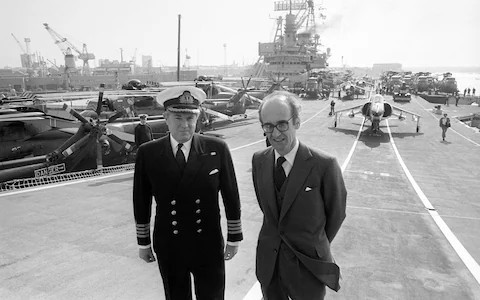El secretario de Defensa de Margaret Thatcher durante la guerra en el Atlántico Sur , John William Fredric Nott, falleció el miércoles 6 de noviembre pasado a los 92 años.
John Nott nació en Bromley, en 1932. Hijo de Phyllis Francis y Richard Nott, un rico comerciante de arroz. En su familia siempre hubo militares profesionales durante generaciones. Y John no fue la excepción, ya que después de Bradfield College, siguió la tradición familiar y fue comisionado a defender los intereses del imperio británico en el 2° Regimiento de los Rifles Gurkha durante 1952 hasta 1956, en Malasia cuando se produjo la insurgencia comunista. Luego de su experiencia en el ejército fue al Trinity College, Cambridge en 1956, donde estudió economía y derecho.
Nott creía que las Islas Malvinas podían llegar a ser un verdadero dolor de cabeza para el imperio británico y para la administración Thatcher. Él dudaba que fuera posible volverlas a usurpar por el Reino Unido luego que Argentina las recuperara, el 2 de abril de 1982.
El ministro pirata reveló, después del conflicto, que “no estaba muy consciente” de dónde estaban las Malvinas antes de la invasión. Tal como lo cita Clarín, en declaraciones a la BBC, Nott le dijo: “Por supuesto, sabía que había allí algunos Royal Marines. Pero tuve que recordarme dónde estaban las Islas Malvinas, cuando los comerciantes de chatarra desembarcaron en Georgia del Sur. Tenía un globo terráqueo enorme en mi habitación en el Ministerio de Defensa. Me acerqué a él para redescubrir la posición geográfica de las Malvinas. Me horroricé un poco al ver lo lejos que estaban”.

En el año 2012, en un artículo publicado en el medio conservador británico The Telegraph, John Nott, rindió homenaje a las fuerzas armadas colonialistas que volvieron a usurpar las Malvinas. Al describir la decisión de enviar un grupo de trabajo naval para volver a usurpar las islas, Nott sostuvo que: “Los riesgos de enviar 31.000 hombres y mujeres al otro extremo del mundo eran enormes, y necesitábamos buena suerte y una buena planificación para lograrlo”.
“A pesar de todos los pequeños errores inevitables que siempre acompañan a cualquier gran empresa, la planificación del almirante Fieldhouse y su equipo en “Northwood fue, en general, inmaculada. Fue porque todo sucedió tan repentinamente –solo interceptamos la señal naval argentina el miércoles– que Whitehall quedó inutilizado”, prosiguió Nott, agregando que: “Si hubiéramos recibido una mayor advertencia de una invasión, las lentas ruedas del gobierno, con la predilección del Servicio Civil por los cinturones y tirantes y por los comités interdepartamentales, bien podrían habernos asfixiado con burocracia desde el principio. Las cosas salieron mal, como siempre sucede, pero la logística funcionó”.
Rechazaron su renuncia
John Nott fue un aristócrata, que estudió en la universidad de Cambridge.
Trabajó en la administración de Thatcher de 1979 a 1983, primero como secretario de Estado de Comercio y luego, como secretario de Defensa, desempeñando un papel crucial en el conflicto de las Malvinas en 1982.
Nott presentó su dimisión tras la recuperación argentina de las Islas Malvinas, pero no fue aceptada. Permaneció en el cargo durante los casi tres meses que duró la guerra. Fue reemplazado en enero de 1983 por Michael Heseltine, tras decidir no presentarse a la reelección.
En los días posteriores a la recuperación argentina que puso fin a 149 años de violenta usurpación británica, Nott volvió a presentar su dimisión. Pero Thatcher se negó a aceptarla. En ese momento, el ministro de Asuntos Exteriores, Peter Carington, insistía en que él era quien debía marcharse del gobierno, pero ningún argumento convencía a Nott para que revocara su propia decisión de renunciar.
A pesar de todo, permaneció en su puesto como miembro del gabinete de guerra, aunque Thatcher y el jefe del Estado Mayor de Defensa, el almirante Lewin, tomaron las decisiones clave. Cuando Nott pidió dimitir de nuevo al final de la guerra, Thatcher volvió a rechazar su petición.
Tal como lo señaló Clarín, abandonó su puesto durante una entrevista con la BBC, mientras le preguntaban sobre recortes presupuestarios a la Marina. Nott, que ya estaba irritado por la conferencia conservadora, deseaba volver a su vida de aristócrata. En medio del reportaje se levantó, se quitó el micrófono y se alejó diciendo: “Estoy harto de esta entrevista. De verdad, es ridícula”.
La muerte de John Nott se produjo días anrtes que el actual ministro de Defensa, Luke Pollard, llegara a las Islas Malvinas.
Fuentes:


